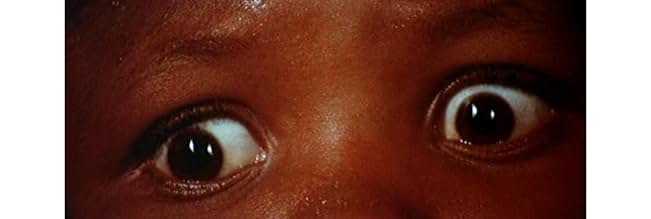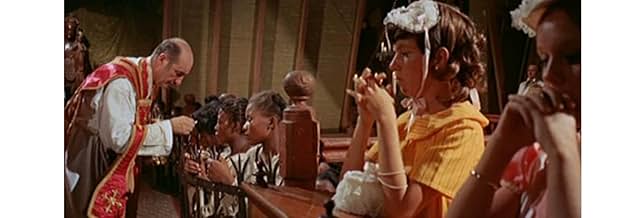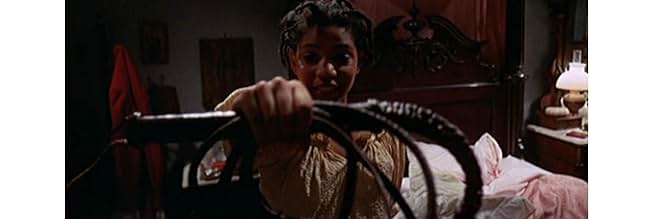AVALIAÇÃO DA IMDb
6,5/10
2 mil
SUA AVALIAÇÃO
Adicionar um enredo no seu idiomaTwo documentary filmmakers go back in time to the pre-Civil War American South to film the slave trade.Two documentary filmmakers go back in time to the pre-Civil War American South to film the slave trade.Two documentary filmmakers go back in time to the pre-Civil War American South to film the slave trade.
- Direção
- Roteiristas
- Artistas
Stefano Sibaldi
- Narrator
- (narração)
Dick Gregory
- Self
- (não creditado)
Gualtiero Jacopetti
- Self
- (não creditado)
Ernest Kubler
- Whip
- (não creditado)
Yayoi Kusama
- Self
- (não creditado)
Franco Prosperi
- Self
- (não creditado)
Shelley Spurlock
- Girl
- (não creditado)
- Direção
- Roteiristas
- Elenco e equipe completos
- Produção, bilheteria e muito mais no IMDbPro
Avaliações em destaque
When I first saw GOODBYE UNCLE TOM several years ago on a muddy bootleg, the level of production value that went into this "shockumentary" impressed me. I was amazed that the filmmakers were able to corral literally hundreds of Black people into degrading and de-humanizing reenactments of various aspects of slavery. But I also understood that this was a very special film for that exact reason. Unlike American films about slavery, it makes no effort to excuse or sugarcoat this heinous act. Like the opening of Bunuel's Un Chien Andalou, the filmmakers intent is to force you to open your eyes to the truthful horrors of this 400 year old practice.
The premise of the film is brilliant--an Italian documentary film crew is transported "back in time" to interview and bear witness to American Slavery on all levels--from rich slave owners, to the "veterinarian" who must clean and delouse the slaves, to the poor whites who don't own slaves but invade their quarters for the purposes of rape this movie holds nothing back, etc. It loses points for some gratuitous nudity and violence (Mandingo, anyone?), and it's contemporary ending (which tries to connect the Black Power movement and the Nat Turner 1831 slave revolt) is somewhat muddled and clearly designed to leave viewers terrified. The concept that Black men still hate white people but crave their women but would prefer to kill them rather than make love to them is an idea better tackled in the film version of Baraka's DUTCHMAN. If the film were made a few years later it might end by raising the question of whether or not Black are still enslaved--not by carnal lust, but in a prison of the mind.
But the recent DVD release of this film (and its Director's Cut) brings to light two things the shoddy bootlegs didn't. (1) Unlike typical grindhouse exploitation, this is first and foremost a work of art--the opening shot, taken from a helicopter flying over a plantation over a field of slaves, then drawing low enough to blow away the bales of cotton and causing the slaves to flee in glee is GENIUS. Every image and idea is incredibly thought out. The score is up there with the best of Morricone and Rota . The photography and widescreen compositions are top-notch.
However, it is unsettling to discover (2), most of the film was shot in Haiti with the full cooperation of mercenary dictator "Papa Doc" Duvaluier and the Tontons Macoutes (who probably had no problem getting hundreds of Hatian natives willing to degrade and dehumanize themselves for the purpose of making a film). ). In the end, this is a painful film to watch on many levels, but deserves to be seen alongside Alex Haley's ROOTS. 8.5/10 Stars.
The premise of the film is brilliant--an Italian documentary film crew is transported "back in time" to interview and bear witness to American Slavery on all levels--from rich slave owners, to the "veterinarian" who must clean and delouse the slaves, to the poor whites who don't own slaves but invade their quarters for the purposes of rape this movie holds nothing back, etc. It loses points for some gratuitous nudity and violence (Mandingo, anyone?), and it's contemporary ending (which tries to connect the Black Power movement and the Nat Turner 1831 slave revolt) is somewhat muddled and clearly designed to leave viewers terrified. The concept that Black men still hate white people but crave their women but would prefer to kill them rather than make love to them is an idea better tackled in the film version of Baraka's DUTCHMAN. If the film were made a few years later it might end by raising the question of whether or not Black are still enslaved--not by carnal lust, but in a prison of the mind.
But the recent DVD release of this film (and its Director's Cut) brings to light two things the shoddy bootlegs didn't. (1) Unlike typical grindhouse exploitation, this is first and foremost a work of art--the opening shot, taken from a helicopter flying over a plantation over a field of slaves, then drawing low enough to blow away the bales of cotton and causing the slaves to flee in glee is GENIUS. Every image and idea is incredibly thought out. The score is up there with the best of Morricone and Rota . The photography and widescreen compositions are top-notch.
However, it is unsettling to discover (2), most of the film was shot in Haiti with the full cooperation of mercenary dictator "Papa Doc" Duvaluier and the Tontons Macoutes (who probably had no problem getting hundreds of Hatian natives willing to degrade and dehumanize themselves for the purpose of making a film). ). In the end, this is a painful film to watch on many levels, but deserves to be seen alongside Alex Haley's ROOTS. 8.5/10 Stars.
Addio Zio Tom: 7/10: Well they don't make them like this anymore and lets face it they never really did. This is really three separate films brought together in a blender set on random. The first film is a highly effective expose on slave treatment and the slave trade in the old south (the slave ship scenes blows Hollywood fare like Armistad out of the water). Using a cast of thousands and exposing practices such as selective breeding that are politely not discussed on American shores (just ask Jimmy the Greek) it simply is one of the most realistic display's of 18th and 19th century slave life ever shown on film.
Then there is a second film which is a dated, and looking back rather silly collection, of news footage from the late sixties and early seventies that documents race riots with all the participants speaking in Italian creating an almost Woody Allen feel to the dub (It gives What's up Tiger Lilly a run for its money complete with ragtime music cementing the silliness of what should be serious proceedings.)
The last movie is a sexploitation film dealing largely with Mandingo fantasies and containing a copious amount of child porn. (I guess National Geographic rules apply when showing thirteen year old black children naked). Needless to say tasteful does not enter into the conversation. Political correctness is shattered so badly one must feel for those sensitive souls that can't laugh at ridiculousness of the manipulation.
Making matters worse the three films are intertwined together seemingly at random with comic buffoonery breaking out during serious scenes (A slave auction is apt to turn into a Benny Hill episode for no apparent reason) and poorly done black revenge fantasies coming, narratively at least, out of nowhere. Anti-white, anti-black and for the sake of inclusion anti-Semitic they once again simply don't make them like this anymore. (It's highly illegal for one thing)
Overlong by at least an hour and very poorly thought out in places Addio Zio Tom wears out its welcome but for a short while at least it exposes the truth and makes one think.
Then there is a second film which is a dated, and looking back rather silly collection, of news footage from the late sixties and early seventies that documents race riots with all the participants speaking in Italian creating an almost Woody Allen feel to the dub (It gives What's up Tiger Lilly a run for its money complete with ragtime music cementing the silliness of what should be serious proceedings.)
The last movie is a sexploitation film dealing largely with Mandingo fantasies and containing a copious amount of child porn. (I guess National Geographic rules apply when showing thirteen year old black children naked). Needless to say tasteful does not enter into the conversation. Political correctness is shattered so badly one must feel for those sensitive souls that can't laugh at ridiculousness of the manipulation.
Making matters worse the three films are intertwined together seemingly at random with comic buffoonery breaking out during serious scenes (A slave auction is apt to turn into a Benny Hill episode for no apparent reason) and poorly done black revenge fantasies coming, narratively at least, out of nowhere. Anti-white, anti-black and for the sake of inclusion anti-Semitic they once again simply don't make them like this anymore. (It's highly illegal for one thing)
Overlong by at least an hour and very poorly thought out in places Addio Zio Tom wears out its welcome but for a short while at least it exposes the truth and makes one think.
Goodbye Uncle Tom is a downright jaw-dropping and surprisingly professional production in the Mondo Cane series. Terrifically shot documentary-style, this film explores the interaction between the races in modern America. Slavery, Black Rage, White Oppression...Jacopetti and Prosperi are all showing it uncensored and without mercy. It's repulsive, shocking and the violence subtly get more under your skin as opposed to the average teenage horror slasher. The inhumanity of previous generations makes you bow your head in shame. Guided by a thrilling Riz Ortolani score (perhaps known best for his Cannibal Holocaust music) Goodbye Uncle Tom shows how black people are being exploited, raped and killed for no reason other than being "inferior". The films opens with a truly atmospheric portrait of how Martin Luther King's death mobilized the black community. Right from that moment, you just know that you're about to see a film that is a lot more intelligent than it seems and ahead of its time when it comes to being provocative. A history lesson that sticks to you! Of course, because of its realism, it cannot be recommended to everyone. Goodbye Uncle Tom is better not watched by the faint-hearted. Highly recommended piece of revolutionary cinema!
Many people who have claimed to see this film have not. Most of those who have seen it, have not understood. GOODBYE UNCLE TOM was directed by Gualtiero Jacopetti & Franco E. Prosperi, the two men who pioneered the documentary movement that came to be known as the "Mondo" film, a term the two dislike immensely. Hot on the heels of their controversial and still-relevant AFRICA ADDIO, it was meant to exonerate them from accusations of racism. Ironically, it would do the exact opposite. It was developed as an idea to adapt the novel "Mandingo" as an historical, documentary style drama. What emerged was a shocking, difficult-to-watch-at-times, treatise on the horrors of slavery, and the source of racism in America, if not the world, today. It was the filmmakers' intention not to pander to a politically correct theory that slaves of the 1840's had a 1970's awareness of their situation. The events are all historically correct. Many of the characters are people who actually lived. The dialogue is verbatim from true manuscripts of the day. The racism is a genuine depiction of plantation life of the day. It was felt that glossing over the African experience in America would be an insult to the pain and suffering of the millions who survived the "middle passage' only to welcome a life a slavery, no different from an animal or piece of property.
Years after it's initial release, the directors have expressed a regret at not opening the film with an explanation stating that this was a film about the emotions of that bygone era, not of the filmmakers themselves.
The controversial final scenes, which take place in contemporary America, are based on "The Confessions of Nat Turner", and are meant to represent an angry, reactionary vengeance on behalf of the millions, with whom the character identifies. Malice for sure, but not unmerited malice. This film should cause strong emotions. Any film that tackles a moral issue must cause debate and conjecture if it is to succeed. What makes the film even more extraordinary is that it succeeds without claiming a moral superiority, or taking a moral stance. What appears on screen are the most graphic, realistic depictions of the North American slave trade of the 19th century, and this film should be required viewing in Black History classes on college campuses, and high schools all over the world, particularly in America. This film preceded ROOTS by six years and stands as a much harsher indictment of the evils of human bondage. This is one of the bravest works of cinema and remains a misunderstood humanitarian masterpiece.
Years after it's initial release, the directors have expressed a regret at not opening the film with an explanation stating that this was a film about the emotions of that bygone era, not of the filmmakers themselves.
The controversial final scenes, which take place in contemporary America, are based on "The Confessions of Nat Turner", and are meant to represent an angry, reactionary vengeance on behalf of the millions, with whom the character identifies. Malice for sure, but not unmerited malice. This film should cause strong emotions. Any film that tackles a moral issue must cause debate and conjecture if it is to succeed. What makes the film even more extraordinary is that it succeeds without claiming a moral superiority, or taking a moral stance. What appears on screen are the most graphic, realistic depictions of the North American slave trade of the 19th century, and this film should be required viewing in Black History classes on college campuses, and high schools all over the world, particularly in America. This film preceded ROOTS by six years and stands as a much harsher indictment of the evils of human bondage. This is one of the bravest works of cinema and remains a misunderstood humanitarian masterpiece.
Not exactly a "humanitarian masterpiece" as someone else said (yeah right!). More like cryptic super-exploitation. This is wildly, hilariously, rollickingly misguided pseudo-history at best. Outright race-baiting at worst. Made by the sleazoids who barfed up "Africa Addios" (giving Africans their own country back so soon just wasn't the right idea, was it!!), a film that featured the genuinely bizarre white South African girls on trampolines montage. A fervent call-to-arms for African-Americans made by white Europeans must inherently ring false, I am afraid. (we enslaved you. kill us!) Manages to be both numbing and completely, hideously insulting at the same time.
The film is, under its very "SO racist it isn't being racist" exterior a sly work of racism. Presents blacks as nothing more than animals and savages, capable only of violence or submission to the will of whites. All the while remaining mute and mindless. No African-American in the film is presented as having a personality, substance, or intelligence. Every white all but glows. Every caucasian is a verbose, mercurial, immaculate sprite.
That said, the film does (I would assume) approximate the way Africans were treated during the slave era more closely than other films. In that respect it deserves respect. The conditions are shown as filthy, disgusting, cruel. Every imaginable indignity is portrayed (and some you probably could not imagine).
However, the film does have some power. The camera work is very inventive and the directors handle some of the chaotic scenes around the plantation very well. Some of the imagery is genuinely striking. There's a general feeling of chaos that comes through that's very effective. I'm not sure what the point is. But it's effective.
Anyway, see the movie if you really want to be grossed out and insulted. File this one under SUPER exploitation. The directors may have had good intentions when they started out, but I think they just lost it when they got onto the set and decided to see how far out they could go. And no one, it seemed, was around to tell them to tone it down or put on the breaks. This is up there with Cannibal Holocaust and Men Behind the Sun. It's that sort of a deal.
But don't kid yourselves, this AIN'T no humanitarian masterpiece.
The film is, under its very "SO racist it isn't being racist" exterior a sly work of racism. Presents blacks as nothing more than animals and savages, capable only of violence or submission to the will of whites. All the while remaining mute and mindless. No African-American in the film is presented as having a personality, substance, or intelligence. Every white all but glows. Every caucasian is a verbose, mercurial, immaculate sprite.
That said, the film does (I would assume) approximate the way Africans were treated during the slave era more closely than other films. In that respect it deserves respect. The conditions are shown as filthy, disgusting, cruel. Every imaginable indignity is portrayed (and some you probably could not imagine).
However, the film does have some power. The camera work is very inventive and the directors handle some of the chaotic scenes around the plantation very well. Some of the imagery is genuinely striking. There's a general feeling of chaos that comes through that's very effective. I'm not sure what the point is. But it's effective.
Anyway, see the movie if you really want to be grossed out and insulted. File this one under SUPER exploitation. The directors may have had good intentions when they started out, but I think they just lost it when they got onto the set and decided to see how far out they could go. And no one, it seemed, was around to tell them to tone it down or put on the breaks. This is up there with Cannibal Holocaust and Men Behind the Sun. It's that sort of a deal.
But don't kid yourselves, this AIN'T no humanitarian masterpiece.
Você sabia?
- CuriosidadesThe movie was originally released in Italy in a 119-minute version and immediately withdrawn when the directors were sued for plagiarism by writer Joseph Chamberlain Furnas. It was re-released in March 1972 in a re-cut 136-minute version under the title 'Zio Tom.'
- Cenas durante ou pós-créditos'Questo film è un documentario. I fatti sono storicamente avvenuti ed i personaggi sono realmente esistiti.' Which translates to: 'This film is a documentary. The facts historically happened and the persons really existed.'
- Versões alternativasBefore receiving a UK cinema certificate in 1973 the film was extensively cut by around 30 minutes by the BBFC with heavy edits to rape scenes, footage of sexual experiments, graphic violence, the fantasy murder sequence, and the opening scenes on the slave ship.
- ConexõesFeatured in Adam & Yves (1974)
Principais escolhas
Faça login para avaliar e ver a lista de recomendações personalizadas
- How long is Goodbye Uncle Tom?Fornecido pela Alexa
Detalhes
- Data de lançamento
- País de origem
- Idiomas
- Também conhecido como
- Goodbye Uncle Tom
- Locações de filme
- Port-au-Prince, Haiti(Majority of interiors and exteriors)
- Empresa de produção
- Consulte mais créditos da empresa na IMDbPro
Contribua para esta página
Sugerir uma alteração ou adicionar conteúdo ausente












